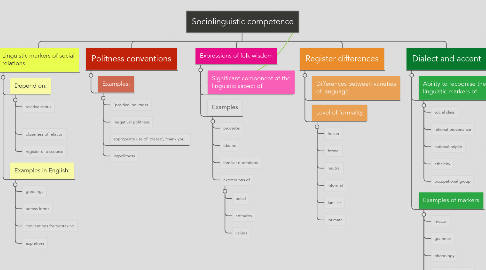Sociolinguistic competence
af Marta Munarriz


1. Linguistic markers of social relations
1.1. Depend on:
1.1.1. relative status
1.1.2. closeness of relation
1.1.3. register of discourse
1.2. Examples in English:
1.2.1. greetings
1.2.2. adress forms
1.2.3. conventions for turntaking
1.2.4. expletives
2. Politness conventions
2.1. Examples:
2.1.1. 'positive' politness
2.1.2. 'negative' politness
2.1.3. appropriate use of 'please', 'thank you'..
2.1.4. impolitness
3. Expressions of folk wisdom
3.1. Significant component of the linguistic aspect of
3.2. Examples
3.2.1. proverbs
3.2.2. idioms
3.2.3. familiar quotations
3.2.4. expressions of
3.2.4.1. belief
3.2.4.2. attitudes
3.2.4.3. values
4. Register differences
4.1. Differences between varieties of language
4.2. Level of formality
4.2.1. frozen
4.2.2. formal
4.2.3. neutral
4.2.4. informal
4.2.5. familiar
4.2.6. intimate
5. Dialect and accent
5.1. Ability to recognise the linguistic markers of
5.1.1. social class
5.1.2. refional provenance
5.1.3. national origiin
5.1.4. ethnicity
5.1.5. occupational group
5.2. Examples of markers
5.2.1. lexicon
5.2.2. grammar
5.2.3. phonology
5.2.4. vocal characteristics
5.2.5. paralinguistics
5.2.6. body language
